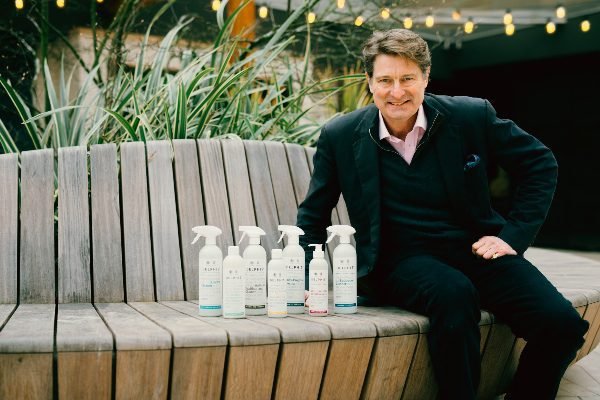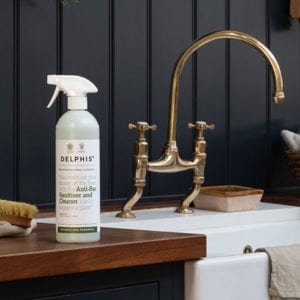‘Check for EU Ecolabel and B Corp’, Mark advises. ‘These two accreditations will mean your eco cleaning product works as well as traditional cleaners, that it is possibly vegan and cruelty free and that the company itself is championing people and the planet. The ‘Made in Britain’ accreditation is important because it means the cleaning product has not been shipped halfway around the world.’
Other things to look out for are colours and scents, both of which biodegrade very slowly, and virgin plastic bottles with triggers that can’t be recycled. ‘What a waste of time for consumers who believe they are cleaning green’, Mark says. ‘They end up disappointed with the result and have actually made a net-negative impact.’
The ‘holy grail of greenness’
All Delphis Eco’s commercial customers buy concentrated products and refill and reuse on site; a 5l Anti-Bacterial Sanitiser is enough for 166 trigger bottle refills.
All bottles are made from 100% recycled plastic; this was something Mark wanted from the start, so he chased down waste collectors, rubbish dumps and plastic suppliers – only to be told his dream wasn’t possible.
Mark found a small, supportive business that was recycling London’s plastic milk bottles, but the company inconveniently went bust.
This left Mark with an even stronger desire to succeed – and the idea to reuse ‘home-grown’ waste products rather than plastics that had been sent round the world to be processed.
‘In the circular economy, keeping production in the UK is the holy grail of greenness’, Mark says. ‘Of course, waste collection firms thought I was mad, but when they realised I was serious they agreed to separate used milk bottles for me.’
Delphis Eco’s bottle blower also needed convincing, as he felt the quality of the plastic wasn’t good enough to go into his plant.
After several conversations around molecule length, Mark persevered and opted to make the bottles slightly thicker.
‘Sure, they are slightly heavier as a result’, he tells us, ‘but UK recycling and manufacture means zero carbon miles, which far outweighs the emissions cost of importing recycled materials from China.’
Pioneering perseverance
As a pioneer in the eco cleaning – and ethical business – sector, Mark’s journey has involved some ‘interesting learnings’. He discovered that the whole recycling arena is ‘one of smoke and mirrors’, where current packaging waste regulations essentially incentivise companies to watch plastic waste being exported to poorer nations for recycling.
‘Given the UK is fast running out of landfill space, it’s no surprise the government is happy to see plastic sent abroad’, Mark says. ‘But we are not fooling anyone if we think recycling facilities in Indonesia, Vietnam or India are more efficient than they are here. Thousands of miles away, mountains of rubbish are building up – and being burned – so we don’t have to deal with the problem.’
Perseverance has also proved an important trait; ‘When it comes to the environment, you encounter plenty of old world thinking’, Mark says. ‘Asking to do new stuff in different ways will typically be met with a shake of a head or a sharp intake of breath; the secret is to have thick skin and a total belief that you are doing the right thing.’
Mark has pushed boundaries and changed opinions by convincing suppliers to work with Delphis Eco – mostly by paying more to get the technology up and running and showing how it will be financially beneficial for everyone in the long run.
He has always made the tough decisions from the start, rather than waiting for shoppers to demand change. As an example, Delphis Eco uses the world’s most ethical printer to produce training guides and information sheets.
‘It costs slightly more but it is a choice we made’, Mark tells us. ‘If every other business followed, prices would fall and infrastructure behind eco ideas like refill stations would become more accessible.’
 Play Video about This Rock Might Just Save The World
Play Video about This Rock Might Just Save The World Play Video about Play 2 hours of rock
Play Video about Play 2 hours of rock Play Video about Play 2 hours of brook
Play Video about Play 2 hours of brook Play Video about Play 2 hours of sheep
Play Video about Play 2 hours of sheep












































